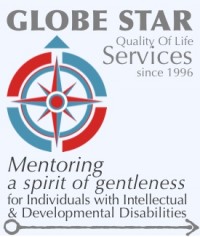Our work with individuals with autism continues to evolve as more becomes researched and understood about this diagnosis and its increased documentation. Globe Star has stayed on the cutting edge of education and development of autism awareness by presenting at conferences, participating in continuing education opportunities, and most importantly, working directly with Individuals with autism and their families. Globe Star has taken a proactive stance by creating an autism program based on the principles of Gentle Teaching.
Programs that originally focused on speech acquisition, cognitive development, and behavior problems, today also incorporate concern for quality of relationships, social skills, leisure skills,  and other dimensions of the child’s life. While aversive or punishing methods were more commonly used years ago, these methods are not advised with the insights and understanding we have today.
and other dimensions of the child’s life. While aversive or punishing methods were more commonly used years ago, these methods are not advised with the insights and understanding we have today.
Autism Program – Outline of Services
- We assess each Individual’s quality of life, including the person’s skills, areas of difficulty, and social/emotional development.
- We develop an individualized and integrative program to address academic skills, fine and gross motor skills, self-care skills, social skills, communication skills, self-regulation skills, and other areas of need.
- We train parents and caregivers in the methodology for the individualized program.
- We teach the child through Structured Skill Development, Applied Skill Development, and Relationship and Emotional Development techniques.
- We monitor the child’s growth and learning through documentation and on-going evaluations.
- We update the child’s program as needed so that we are continually working toward improving the child’s Quality of Life.
Globe Star’s Autism Program is available through Medicaid Waivers, private insurance companies, and private pay.
Autism Program – Our Framework
Through our Gentle Teaching philosophy, we follow a framework for interacting with each child that nurtures an environment for learning and growth.
Valuing
Valuing means using our hands, eyes, words, and presence to honor and respect the Individual. Our valuing is given unconditionally, depending not on the person’s behavior, but rather recognizing the person’s intrinsic worth. Valuing is given for who the person is, not for what the person does. This commitment to unconditional acceptance builds solidarity with the person and teaches him/her to feel safe with us.
Teaching
Teaching Individuals with autism requires us to look for teaching moments throughout the day and in all environments. The goal of our teaching is not only to make progress on goals and objectives, but more importantly, to teach the value of learning and the value of being with others. Our integrative teaching strategy incorporates discrete trial training, spontaneous play, communication curriculums, and other methodologies recommended for working with children with autism. By drawing from different schools of thought, we incorporate the best of what each has to offer in helping children learn and grow.
Protecting
Protecting is a combination of how we prevent crisis situations and how we respond if those situations occur. When we are with an individual, we can prevent crisis situations by recognizing and addressing situations where the person feels unsafe. If a crisis situation has already arisen, protection means ensuring everyone’s safety through nonviolent actions. This does not mean overpowering or restraining the Individual, but rather responding with warmth and gentleness to prevent further escalation of the crisis.
Reciprocating What Has Been Learned
Reciprocation draws us into equality. As caregivers, we have to teach the goodness of being valued as well as its return. Reciprocation is what the child gives back as a result of our Valuing, Teaching, and Protecting.
A child reciprocates the value of our teaching when she demonstrates excitement or pride at learning, enjoyment of the time with her caregiver, or learning of new skills. By engaging the child in meaningful activities, we support his growth and development as he learns to value himself, his caregiver and others, and the learning process.
Reciprocation is a reflection of our teaching as we nurture the Quality of Life of each child with autism.
Autism Program – Guiding Principles
Below are some of the guiding principles we follow to help maximize each child’s quality of life.
Teaching Strategies
Children have a variety of needs, preferences, and learning styles, and as a service provider, Globe Star must account for these as we develop a plan for each child. Globe Star uses three teaching strategies in our Autism Program:
Structured Skill Development – technique where the skill is broken down through a task analysis and taught systematically, such as through discrete trial training
Applied Skill Development – technique where skills are introduced and generalized in the natural environment
Relationship and Emotional Development – technique where skills are taught during high-affect interactions that promote language and the ability to initiate
These techniques complement each other to address a variety of skills and to provide a broad foundation for learning.
Family Involvement
We believe that parents are the most powerful resource in a child’s learning program. Your child may grow and flourish with the help of many wonderful teachers and professionals. But you, the parent, have love and a commitment to this child that no one else can equal. Globe Star helps parents seize the power of that love and commitment to become inspired and effective teachers, program directors, and advocates for their children.
OT Services at Globe Star – downloadable brochure
